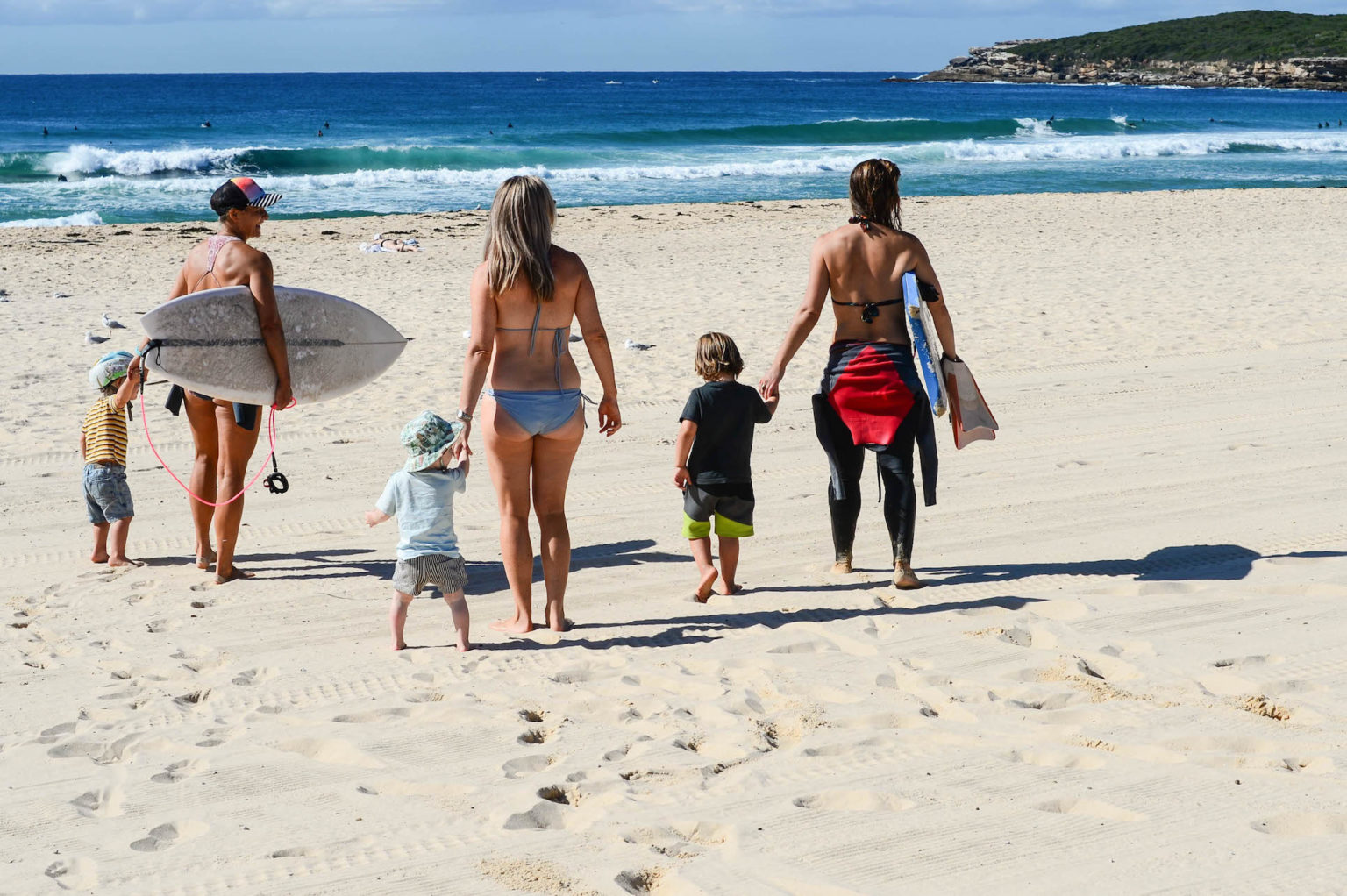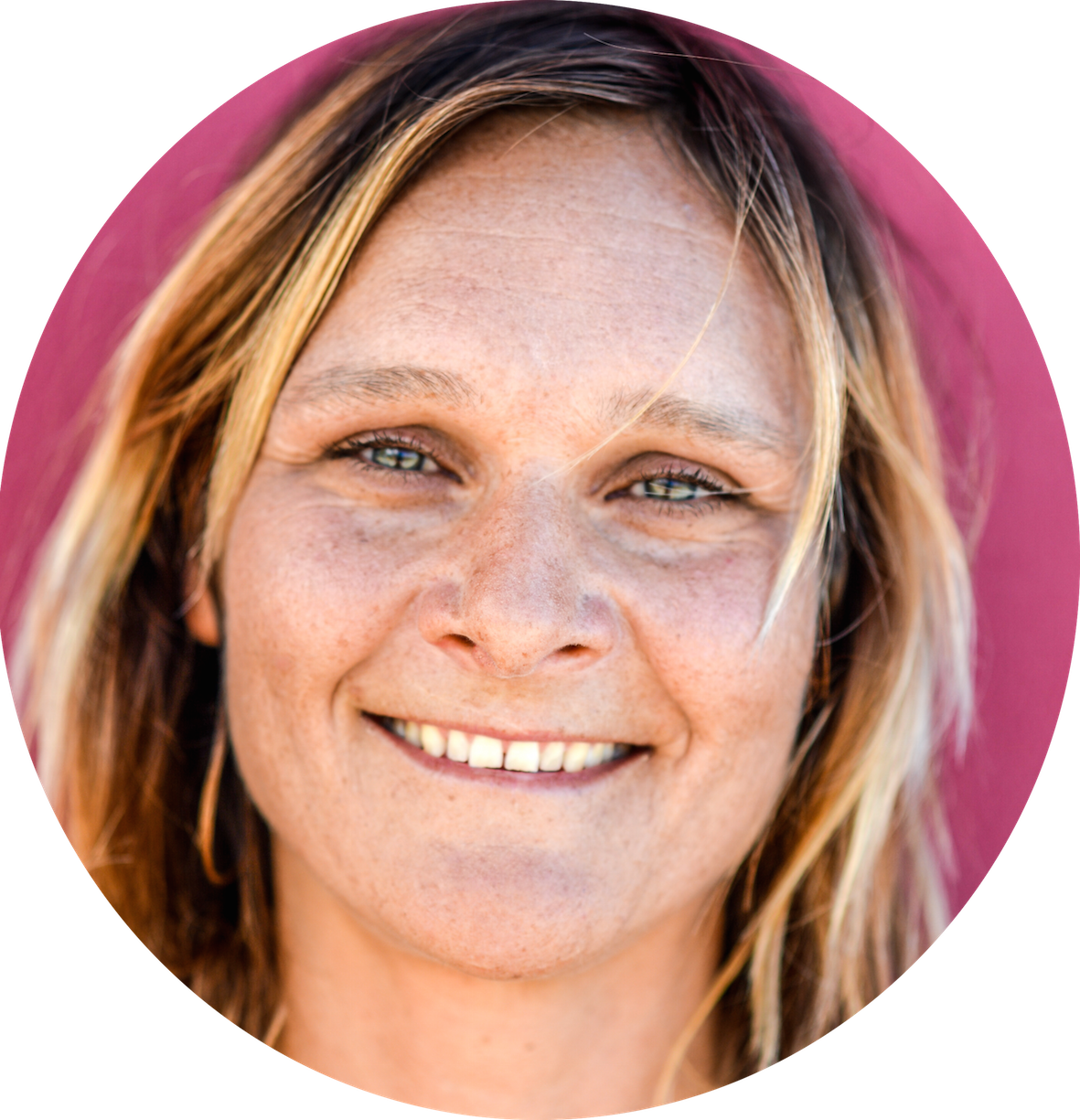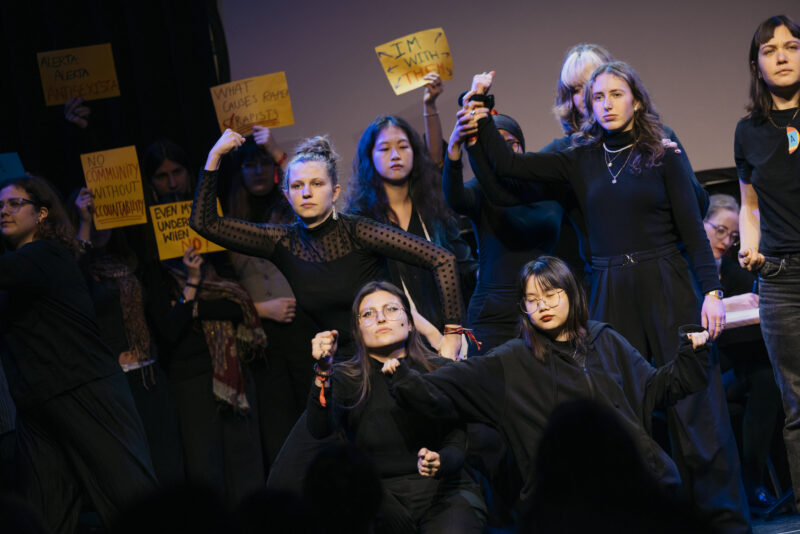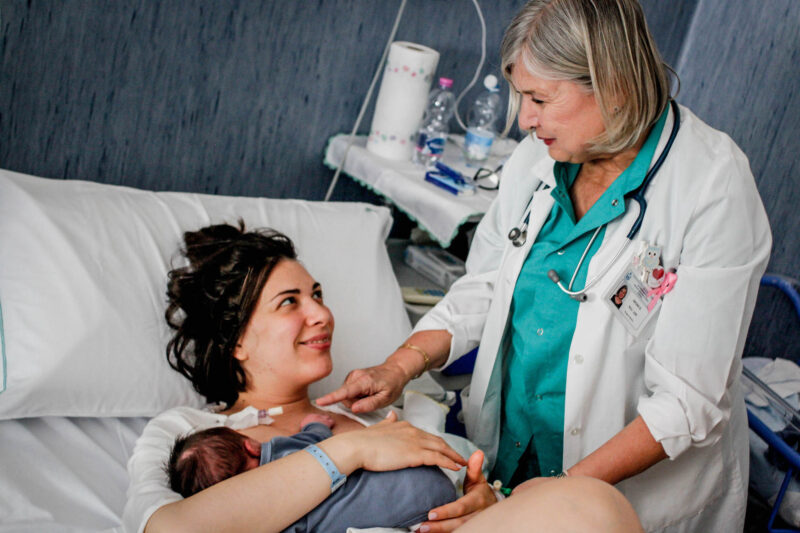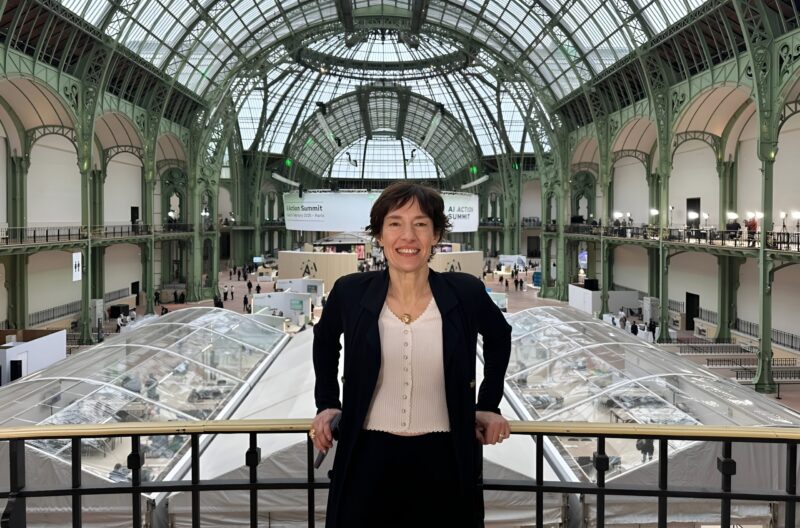Nandi Spry has given birth to three children and Megan Wykes to six. Both have their hands full but still manage to surf every week – thanks to a unique community group, Surfing Mums.
By Ragna Swyter, Sydney
Dripping wet but with a relaxed and happy expression and a surfboard under arm, Nandi Spry and Megan Wykes come out of the bush. They had to cross it on their way from the beach. Just in from the surf, the mothers give their children a big hug.
The Australians live in Sydney. However, this weekend they are at Seven Mile Beach, a two-hour drive south of the city. The non-profit organization “Surfing Mums”, which is widespread throughout Australia, holds its annual general meeting here – at a campsite. Around 30 women from all over the country are attending the event. Some come with their partners and children, some come without in search of ‘me’ time. Of course, surfing is top of the agenda. “Surfing Mums has literally changed my life,” beams Nandi Spry. “Mums need constant encouragement, especially after having babies. The group brought to me that stability and confidence to push through.”
The principle of Surfing Mums
Nandi Spry and Megan Wykes are two of nearly 400 mothers who belong to the Surfing Mums organization and who besiege their local beaches and beach playparks with prams, diaper bags and surfboards. The swapping system is simple and works in teams of two: one mother goes surfing for an hour, while the other takes care of the children with other mothers, feeds them and sometimes settles a dispute. Then it is switched.
Surfing Mums groups are run by a local coordinator, and meet once or twice weekly, usually in the morning when older children are at school. Whether beginner or half professional surfer, infant or kindergarten child – everyone is welcome. Some live in the immediate vicinity, others take a longer drive to participate. An annual fee of 33 euros covers public liability insurance. The website outlines along with what to expect at a meet, tips for settling in new children. But one sentence particularly sticks in mind: ‘the waves are just the beginning…’
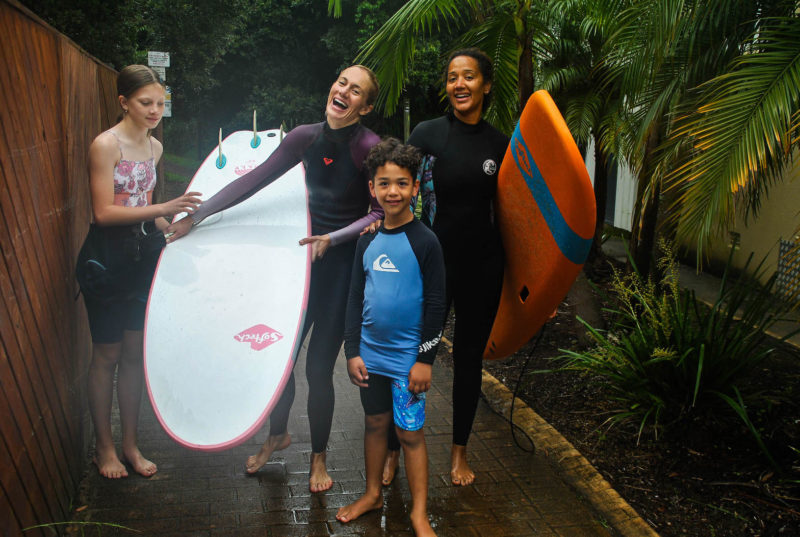
Surfing Mums was born in 2008 in the Australian surf and hippie Mecca Byron Bay, on the east coast of the continent. There, the ocean lures every day with gentle, peeling waves. However, some surfing enthusiasts – the parents of babies or young children, they could only look at the waves from the beach. Childcare is expensive in Australia, a full day in day care can cost up to 100 euros and places are limited. Care by other family members such as grandparents is often not possible. Since around 30 percent of Australians are immigrants, childcare by extended family or grandparents is not always possible. According to the Australian Bureau of Statistics, Australians naturally flock to the coast, which often involves moving away from family who would otherwise take up childminding duties. And if the partner works full-time, no other caregiver is available.
The concept of swapping child-minding duties for surfing quickly spread, there are now over 40 official Surfing Mums groups around Australia and even a group in Hawaii. An Australian woman introduced the Surfing Mums system there in 2018.
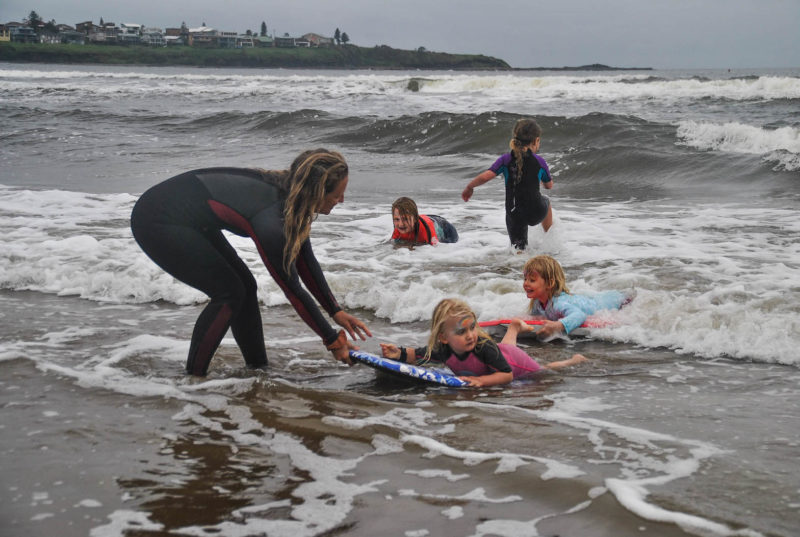
Surfing as a remedy
Why is surfing so important to women? To understand this, it helps to look into the phenomenon of surfing. Salt water has a positive effect on the body: skin, immune system, breathing – quite a lot of benefits already from just jumping into the sea regularly. Add to that the physical and mental challenge of surfing, and the mix is almost perfect. Surfing has even been prescribed by doctors, as it has shown to have antidepressant effects on humans.
It is said that surfing can help with depressive symptoms such as negative thoughts, insomnia and irritability. A US study, for example, proved that just half an hour of surfing can significantly increase feelings of happiness. It is well known that exercise triggers the release of endorphins in the human body, which is why another study compared the results with other sports. The result: Surfing increases relaxation and serenity like no other sport and participants left the sea with the unique feeling of having achieved something. The surf therapy, which has worldwide a huge increase in popularity, is based on these results.
Multiple mother Megan Wykes can only confirm those results. “I’ve been constantly pregnant in the last ten years. This year I decided it was time to do something for myself and to achieve one of my dreams and decided to learn to surf,” she says laughing at the campsite. Learning to surf is easily accessible in Australia. Around 87 percent of Australia’s population lives within 50 kilometres of the coast. Since the sport is hugely popular, surfboards and wetsuits are more affordable than in Germany. Once they are geared up, they can book lessons or even head straight into the waves and give it a go.
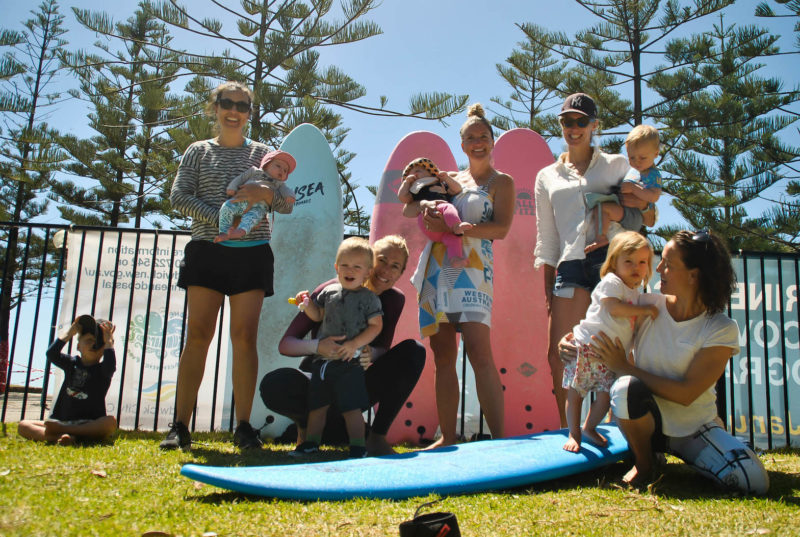
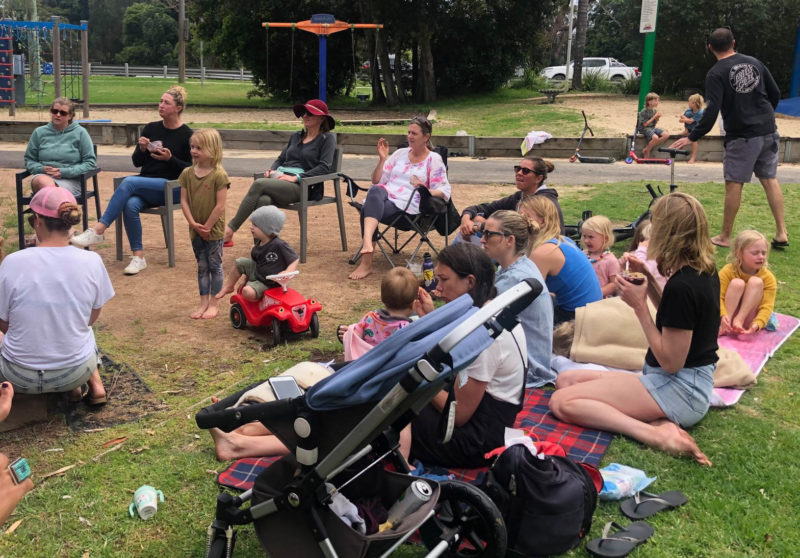
Understandably, the barrier for busy mum Megan Wykes was time. “The regular meeting with the Surfing Mums is different from the rest of my week which is mainly household chores, stress, screens – mostly indoors. Diving into the ocean can wash away all worries. It’s great to go surfing with a group of mums – we go through ups and downs together and most importantly we have plenty of laughter.”
But it is not only beneficial for the mothers. Eve Clark has been around at the Surfing Mums for a long time. She no longer has a toddler, her son is ten years old. “I started Surfing Mums when my son was two,” recalls the single mother. “I just wanted to surf,” she says, but she got much more. Like all other mothers, she lists: friendships and community, time for herself, fun in and out of the water, friends for the kids and the opportunity for the children to experience nature and be outside.
Eve Clark works in health promotion in the school sector and sees the positive influences on the children above all other benefits. ” Kids may not want to come to the beach and put down their screens. Parents may have to make them go and then once they are there, they love it.” In Australia, the pandemic has nearly doubled children’s screen time. Educational institutions with a focus on nature, such as in Germany, for example, “Waldkindergarten”, do not exist in Australia.
Pendant: Climbing family in Switzerland
Cornelia Ganzoni and Sandra Cavigelli’s children are also able to play in nature – even if the two mothers from Switzerland do not ride waves but climb steep rock faces. Cornelia Ganzoni lived in Australia for a while and was part of a surfing mums group there. “I learned to surf there and made wonderful friends. The meetings allowed me to be outdoors and in the ocean. And to have time for myself. That was incredibly valuable to me.” Back in Graubünden, she knew that she wanted to find something here that would allow her to combine sport and family.
Together with climbing enthusiast Sandra Cavigelli, she created the group ‘KletterFamilia‘ a year ago. It was important to both that the offer should also apply to fathers. Meanwhile, a solid core of around six families with children aged six months to four years comes to the weekly meetings. Climbing or bouldering takes place outside, if the weather cooperates; in the indoor climbing gym when it rains or is too cold. The system is similar. “One part is climbing while the others are playing. And in summer we organize whole climbing days,” says Cornelia Ganzoni. Together with Sandra Cavigelli, she dreams of finding more groups in the Swiss mountains to meet and exchange ideas.
By the way, the meeting of the Australian Surfing Mums almost ended abruptly when heavy rain started in the evening and did not stop for the rest of the weekend. The ocean was grey and there were hardly any waves. However, it didn’t really bother anyone. Many went into the water anyway, together with the other families they played, laughed and made new friends. For Megan Wykes and Nandi Spry it was another great experience together with other Surfing Mums.

